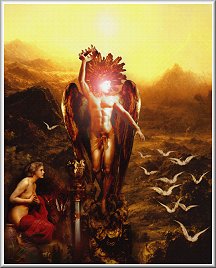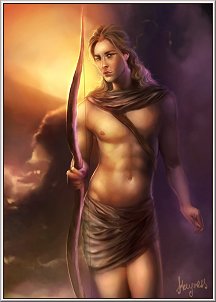
APOLLO
CLICK TO
ENLARGE

APOLLO
CLICK TO ENLARGE
|
APOLLO PAGE TWO
continued from
page one
Apollo was also the Healer-god, who first taught men medicine
and the art of healing. Apollo's interest in healing suggests an
ancient association with plague and its control.
His son, Asclepius, was also identified with healing - indeed,
so accomplished was Asclepius in medicine that an enraged Zeus
killed him with a thunderbolt for daring to bring a mortal back
to life.
One of Apollo’s great deeds for humans was his killing of the
serpent Python, who lived in the caves of Parnassus - because of
this he was sometimes called Pythian. He killed this monster, a
favorite of the goddess Hera, to avenge its harassment of his
mother Leto while she was pregnant and looking for a place to
deliver her twins.
Incredibly, Apollo slew this feared snake when he was only four
days old, as we learned earlier. Mother Earth reported this
murder to Zeus, who was outraged. Apollo didn't care - He
disregarded Zeus's command to visit Tempe and be purified,
instead choosing to travel to Crete, where King Carmanor
performed the purification ceremony.
Upon returning to Greece, Apollo sought out the god Pan and
coaxed him to reveal the art of prophecy. Next he seized the
Delphic Oracle and retained its priestess, called the Pythoness,
in his own service. That's how Apollo's worship at Delphi came
to be.
Marsyas was another of Apollo's victims, meeting a fate most
gruesome. The story goes that the goddess Athena had crafted a
double-flute from the bones of a stag, and with it had
entertained the gods at a banquet. Athena couldn't figure out
why Hera and Aphrodite were snickering and trying to hold back
their laughter, even though the sound from the double-flute was
wonderful.
Later she went down to a stream and played the flute, watching
her reflected image in the water. Sure enough, she discovered
that blowing on the flute gave her a bluish face and swollen
cheeks, and that's what was making the other goddesses laugh.
In disgust, Athena hurled away the flute and laid a curse on
anyone who picked it up.
Enter poor Marsyas. Finding the double-flute, he no sooner
placed it to his lips than it played a sweet melody on its own,
inspired by the memory of Athena's music.
Amazed and filled with wonder, Marsyas travelled from town to
town playing the flute, and soon he was hailed as a musician
surpassing even the great Apollo. Marsyas didn't bother to
correct them, which aroused the wrath of Apollo.
He challenged him to a contest, with the loser being at the
complete mercy of the victor. The Muses were to be judge. The
two musicians played equally well, until finally Apollo turned
his lyre upside down and demanded that Marsyas do the same,
singing and playing at the same time.
This was impossible to do with a flute and Marsyas lost the
contest. Then, the otherwise sweet and bright Apollo showed a
rare dark side, flaying Marsyas alive and nailing his skin to a
pine tree. This myth was meant to serve as an example for
mortals not to compete with the gods.
APOLLO CONTINUES ON PAGE
THREE
LOTS OF GREAT STORIES & COOL PIX
CLICK HERE!

|







